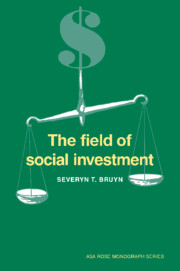Book contents
- Frontmatter
- Contents
- Preface
- Part I The idea of social investment
- 1 The meaning of social investment
- 2 The activity of social investment
- 3 A theory of social investment
- Part II Social criteria and research
- Part III Global social investment
- Epilogue: Social investment as a self-correcting movement in the market system
- Notes
- Bibliography
- Name index
- Subject index
- Title in the Series
3 - A theory of social investment
Published online by Cambridge University Press: 19 January 2010
- Frontmatter
- Contents
- Preface
- Part I The idea of social investment
- 1 The meaning of social investment
- 2 The activity of social investment
- 3 A theory of social investment
- Part II Social criteria and research
- Part III Global social investment
- Epilogue: Social investment as a self-correcting movement in the market system
- Notes
- Bibliography
- Name index
- Subject index
- Title in the Series
Summary
The practice of social investment is so varied and the interests of institutional investors so diverse that it would seem impossible to devise a social logic that would characterize social investing as a profession. Most fiduciaries today argue that it is quite inappropriate to develop a social theory. Nevertheless, this is our task. We want to broaden our understanding of social investment as a practice by formulating a conceptual framework to account for it. This framework, essential in building a foundation for social investment as a professional field of knowledge, can then be utilized for empirical research as well as for critical judgments about investment practice.
A theory of social investment is valuable to investors in three ways. First, it provides insight into the complex nature of investment within the context of society by broadening the vision of investors and encouraging them to take more factors into account, which should in turn increase their capacity to predict the outcome of their decisions. Second, a theory provides testable propositions for social research. Such research should yield facts that improve the accuracy and the wisdom of investments. Third, the insights gained from theory and research should encourage investors to become more self-critical about investment as an institutional activity. Impartial studies of investment outcomes should quicken the ability of fiduciaries to discern whether investments function in the public interest as well as in the interest of their clients.
- Type
- Chapter
- Information
- The Field of Social Investment , pp. 38 - 70Publisher: Cambridge University PressPrint publication year: 1987
- 1
- Cited by

